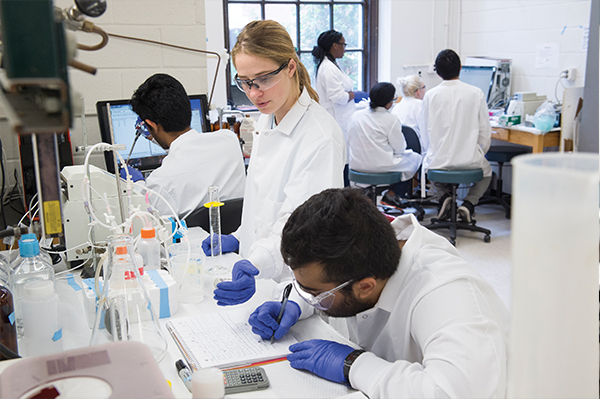
In the Department of Chemical and Biomolecular Engineering, there’s one course where everything starts coming together. It’s here—in a class fondly known as Senior Lab—that they begin to transform from passive receivers of knowledge into engineers who troubleshoot equipment quirks and adjust experiments on the fly.
Student teams rotate through three experiments—complete with built-in pitfalls—exploring distillation, membrane separation, biocatalysis, bioreaction, and gas absorption. They are charged with responding to challenges (intentionally vaguely worded) related to scaling up manufacturing processes and maximizing product outputs.
“We don’t tell you what to do; you’re going to have to figure it out,” Lise Dahuron, senior lecturer, tells a recent group of undergrads. “There is no right solution. There are 100 answers to any question.”
For the most part, students seem to take the challenge in stride. “You don’t know what you’re doing at first, but you learn when to recalculate, which data you need to get [again], and what factors you need to be careful of—what you have to consider before you do the experiment,” says third-year student Yoon Ki Joo.
Joseph L. Katz, now professor emeritus, created Senior Lab back in 1979. His intent was to move beyond the purely theoretical to provide students experience with practical tasks in the lab. “The students become capable of self-teaching in a complicated, unknown situation,” Katz says. “That’s the key thing about an engineer: that he or she can figure out what needs to be done.”
Since then, Senior Lab has gained a reputation for being one of the most difficult but worthwhile courses. Teams design and carry out their own investigations, analyze their results, and document their conclusions in professional reports and oral presentations, supported by a writing professor from the Johns Hopkins Center for Leadership Education. In addition to Dahuron, instructors include professors Sharon Gerecht, the Kent Gordon Croft Investment Management Faculty Scholar, and Marc Ostermeier, as well as senior lecturers An Goffin and Carmo Pereira.
“Before, I would just think about the instructions I was given to follow,” says fourth-year student Jieun Park. “Now, I try to figure out what parameters I need to consider to get a good result, how to determine what a good result is, and what limitations I need to work within.”




